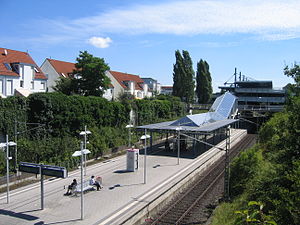Esslingen is a Landkreis (district) in the centre of Baden-Württemberg, Germany. Neighboring districts are Rems-Murr, Göppingen, Reutlingen, Böblingen and the district-free city Stuttgart.

The Stuttgart Rack Railway is an electric rack railway in Stuttgart, Germany, known affectionately as the Zacke (spike) by the local residents. The line opened on 23 August 1884 and links Marienplatz in the city centre to Degerloch on the Filder plateau. It is integrated with the Stadtbahn network of the Stuttgarter Straßenbahnen (SSB) as Line 10. At Marienplatz it connects with lines U1 and U14 and at Degerloch it connects with lines U5, U6, U8 and U12. Ordinary VVS tickets are valid.

Hohenheim is one of 18 outer quarters of the city of Stuttgart in the borough of Plieningen that sits on the Filder in central Baden-Württemberg. It was founded in 1782.

The Stuttgart Stadtbahn is a semi-metro system in Stuttgart, Germany. The Stadtbahn began service on 28 September 1985. It is operated by the Stuttgarter Straßenbahnen AG (SSB), which also operates the bus systems in that city. The Stuttgart Stadtbahn is successor system of a tram network (Straßenbahnen) that characterized the urban traffic in Stuttgart for decades.

Stuttgarter Straßenbahnen AG (SSB) is the principal public transport operating company in the German city of Stuttgart. The SSB is a member of the Verkehrs- und Tarifverbund Stuttgart (VVS), and operates the Stuttgart Stadtbahn, bus lines, a rack railway, and a funicular railway.

The Railway Vehicle Preservation Society is one of the oldest societies in Germany that runs a museum railway. The headquarters of the GES is in Stuttgart.

The Stuttgart–Horb railway is a 67.227 kilometer-long railway in the southern part of the state of Baden-Württemberg in Germany, running from Stuttgart to Horb. It forms part of a railway known as the Gäubahn or Gäu Railway. The Royal Württemberg State Railways and the Baden State Railways constructed the majority of this line between the years 1866 and 1879. Today the partially single-track, fully electrified line features the high-speed Intercity-Express (ICE) service, with its tilting train technology, traveling from Stuttgart to Zürich. In addition, a multitude of local train services of numerous railway companies are on offer. The Gäu Railway is also a significant line in the North-South freight service system.

Esslingen (Neckar) station is the most important station in the town of Esslingen am Neckar in the German state of Baden-Württemberg and is located 13.2 kilometres (8.2 mi) from Stuttgart Hauptbahnhof on the Fils Valley Railway.
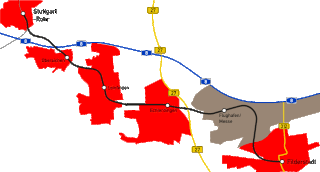
The Stuttgart-Rohr–Filderstadt line is an electrified, and mostly double-track line main railway in the German state of Baden-Württemberg. It branches in the Stuttgart district of Rohr from the Stuttgart–Horb railway and runs via Oberaichen, Leinfelden, Echterdingen and Stuttgart Airport to Bernhausen, a district of Filderstadt. It is now part of the Stuttgart S-Bahn.
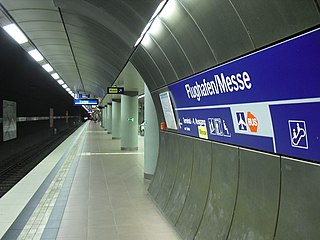
Stuttgart Flughafen/Messestation is a station on the network of the Stuttgart S-Bahn. Despite its name the station is not in the city of Stuttgart, rather it is in Leinfelden-Echterdingen.
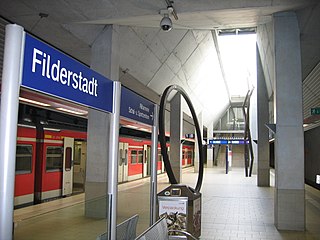
Filderstadt station is the end point of the railway from Stuttgart-Rohr. Line S 2 of the Stuttgart S-Bahn terminates here.

Rohr station is located the chainage of 16.7 km on the Stuttgart–Horb railway and is a station in the network of the Stuttgart S-Bahn.
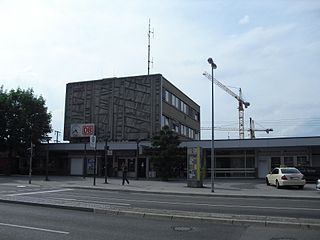
Böblingen station is located on the Stuttgart–Horb railway and is at the start of the Rankbach Railway (Rankbachbahn) and the Schönbuch Railway (Schönbuchbahn). It is served by regional services and Stuttgart S-Bahn line S 1. Until 2002 it was served by Intercity-Express and Cisalpino services.
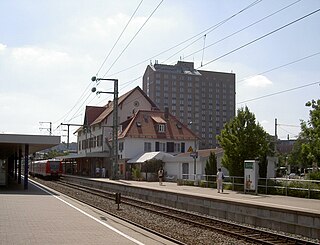
Vaihingen station is located on the Stuttgart–Horb railway in the German state of Baden-Württemberg. It is served by regional services and Stuttgart S-Bahn lines S1, S2 and S3. It is also a hub for public transport to the Filder plain.
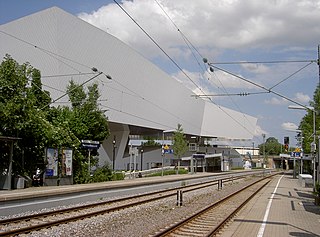
Neuwirtshaus (Porscheplatz) station is on the Stuttgart S-Bahn in the Stuttgart district of Zuffenhausen in the German state of Baden-Württemberg.

Obertürkheim station is located in the Stuttgart district of Obertürkheim in the German state of Baden-Württemberg. It is located at the 9.3 kilometer mark of the Fils Valley Railway and is a station on the network of Stuttgart S-Bahn.The station building is a listed building, which now houses apartments and shops.
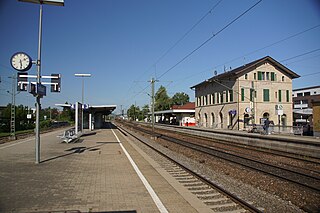
Fellbach station is located in Fellbach on the Stuttgart-Bad Cannstatt–Nördlingen railway in the German state of Baden-Württemberg and is a station on the Stuttgart S-Bahn network.

Oberaichen station is located in Leinfelden-Echterdingen at the 18.9 kilometre point of the Stuttgart-Rohr–Filderstadt railway in the German state of Baden-Württemberg and is a station on the Stuttgart S-Bahn network.

Leinfelden station is located in Leinfelden-Echterdingen at the 20.6 kilometre point of the Stuttgart-Rohr–Filderstadt railway in the German state of Baden-Württemberg and is a station on the Stuttgart S-Bahn network.
A number of narrow-gauge lines survive, largely as a consequence of German reunification, in the former East Germany where some of them form part of the public transport system as active commercial carriers. Most extensive of those still employing steam traction is the Harz mountain group of metre-gauge lines, the Harzer Schmalspurbahnen. Other notable lines are the Zittau–Oybin–Jonsdorf line in Saxony, the Mollibahn and the Rügensche Kleinbahn on the Isle of Rügen on the Baltic coast and the Radebeul-Radeburg line, Weisseritztalbahn in the suburbs of Dresden. Although most rely on the tourist trade, in some areas they provide significant employment as steam traction is particularly labour-intensive.
